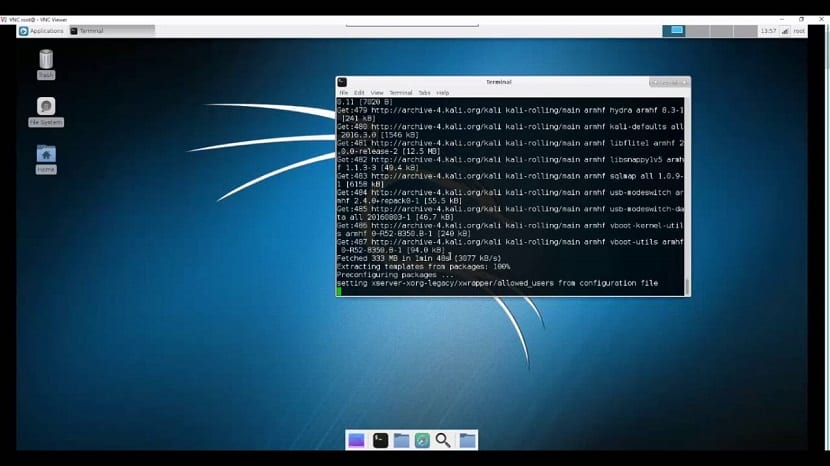
Few days ago Offensive Security made a special statement on his blog, in which gives the announcement that it has released a new version of its operating system, Kali Linux 2018.4
Formerly known as BackTrack Linux, Kali Linux is a Debian-based hacking and penetration testing operating system, which offers the latest Linux technologies and updated components.
Kali Linux is a distribution with a collection of forensic and security tools. This distro is practically a security testing platform, which can be used as a Live CD.
In addition, distribution includes tools to speed up password selection (Multihash CUDA Brute Forcer) and WPA (Pyrit) keys using CUDA and AMD Stream technologies, which enable the use of NVIDIA and AMD GPUs to perform computational operations.
The best of all, is available in 32-bit, 64-bit, with variants for ARM, as well as specific builds for many popular hardware platforms.
About the new version of Kali Linux 2018.4
The fourth and last version of this year 2018, Kali Linux 2018.4, is available for download. This version brings Linux kernel 4.18.10, features numerous bug fixes and includes many updated packages.
Kali Linux 2018.4 It also includes updated packages for Burp Suite, Patator, Gobuster, Binwalk, Faraday, Fern-WiFi Cracker, RSMangler, Harvester, Wpscan, and many others.
Likewise, Wireguard was added. This is a safe and easy-to-use VPN solution and eliminates many of the headaches in creating virtual private networks.
Kali Linux 64-bit for Rapberry Pi

For Those of us who are Raspberry Pi users know in advance that a Kali Linux image already exists for our device, which is already configured or we have the option of being able to configure it to our liking using the Kali Linux manuals.
But in this new release and being one of the main novelties of this, the Kali Linux developers have finally released a first image for the 3-bit Raspberry Pi 64.
The Kali Linux image for the Raspberry Pi 3 is still in an experimental phase, so the developers give the warning that it is very likely that we will find flaws in this new image.
Upgrade to Kali Linux 2018.4
If you already have a Kali Linux installation they can easily upgrade to this new version without the need to reinstall the system.
To do this we must open a terminal with Ctrl + Alt + T and in it we are going to type the following commands:
apt update && apt -y full-upgrade -y
Once this is done, they will begin to download and update the system packages, this process may take a while, so I recommend you do not despair.
At the end of the update, you must restart your system so that the changes are applied in addition to that you can start your system with the new Linux Kernel that was released in this update.
To verify that your installation is up to date, you can do it with these commands:
grep VERSION /etc/os-release VERSION = "2018.4" VERSION_ID = "2018.4"
uname -a Linux kali 4.18.0-kali2-amd64 # 1 SMP Debian 4.18.10-2kali1 (2018-10-09) x86_64 GNU / Linux
Download and get Kali Linux 2018.4
In order to download this new version of the distribution You can go directly to the official website of the project where you can find the system image in its download section.
You can save the image with the help of Etcher on a USB. Also if you want to test the test image for the Raspberry Pi 3, you can record your image with Etcher on your previously formatted Mirco SD.
All original developments created within the distribution are distributed under the GPL license and are available through a public Git repository.
A full iso image (2,9 GB) and a reduced image (867 MB) have been prepared for download.
Sets are available for x86, x86_64, ARM architectures (armhf and armel, Raspberry Pi, ARM Chromebook, Odroid).
In addition to the basic compilation with GNOME and a reduced version, there are options with Xfce, KDE, MATE, LXDE, and Enlightenment e17.
Hello greetings to the community .. let's see I have the kali 2016.1 version ... I put this in a terminal
apt update && apt -y full-upgrade -y
It turns out that I do not update to 2018.4 I get this error
Ign: 1 http://deb.debian.org/debian stretch InRelease
Obj: 2 http://deb.debian.org/debian-security stretch / updates InRelease
Obj: 4 http://deb.debian.org/debian stretch-updates InRelease
Obj: 5 http://deb.debian.org/debian stretch release
Des: 3 http://kali.download/kali kali-rolling InRelease [30,5 kB]
Err: 3 http://kali.download/kali kali-rolling InRelease
The following signatures were not valid: KEYEXPIRED 1517583136 KEYEXPIRED 1517583136 KEYEXPIRED 1517583136 KEYEXPIRED 1517583136 KEYEXPIRED 1517583136
Reading package list ... Done
W: There is no public key available for the following key identifiers:
EF0F382A1A7B6500
W: GPG error: http://kali.download/kali kali-rolling InRelease: The following signatures were invalid: KEYEXPIRED 1517583136 KEYEXPIRED 1517583136 KEYEXPIRED 1517583136 KEYEXPIRED 1517583136 KEYEXPIRED 1517583136
E: The repository 'http://http.kali.org/kali kali-rolling InRelease' is not signed.
N: Updating from such a repository can't be done securely, and is therefore disabled by default.
N: See apt-secure (8) manpage for repository creation and user configuration details.
can you help me….???